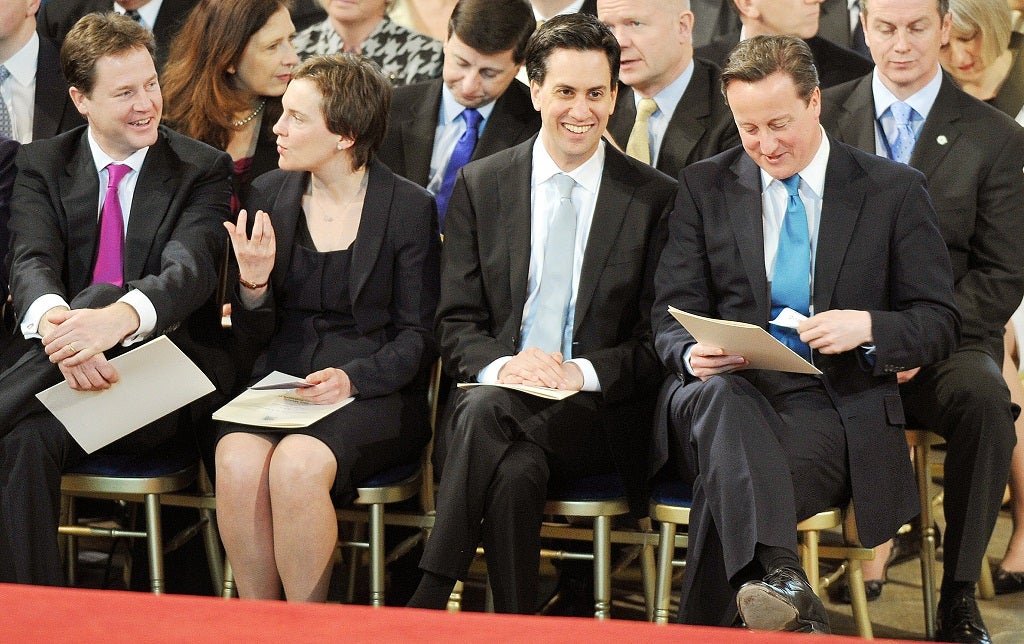An era of coalitions could be upon us
.. but if it is, they should be more mature than this one, and Labour needs a radical rethink of how it conducts its politics


Your support helps us to tell the story
From reproductive rights to climate change to Big Tech, The Independent is on the ground when the story is developing. Whether it's investigating the financials of Elon Musk's pro-Trump PAC or producing our latest documentary, 'The A Word', which shines a light on the American women fighting for reproductive rights, we know how important it is to parse out the facts from the messaging.
At such a critical moment in US history, we need reporters on the ground. Your donation allows us to keep sending journalists to speak to both sides of the story.
The Independent is trusted by Americans across the entire political spectrum. And unlike many other quality news outlets, we choose not to lock Americans out of our reporting and analysis with paywalls. We believe quality journalism should be available to everyone, paid for by those who can afford it.
Your support makes all the difference.Cosy texts between Ed and Vince. Lib Dem-hating Tory backbenchers who tell their Labour Oppo's they have already written off the next election. Public antipathy to being sold a pup by the Government that austerity is working when it palpably isn't. Does all this mean politics is shifting to a Labour win next time?
Although conventional wisdom says it's too big an ask for Ed Miliband to lead Labour to victory in 2015 after such a terrible defeat just five years before, new times defy electoral orthodoxy.
The Tories took office without winning on a historically low base for a governing party. Their vote inched up painfully slowly from a low of 30.7 per cent in 1997 to 31.7 per cent in 2001, then to 32.4 per cent in 2005 Ω and finally to just 36.1 per cent in 2010.
Despite facing Gordon Brown, an unpopular prime minister, and a Labour government which had lost the public's trust, mainly by being in office during the worst global banking crisis for 80 years, the Tories gained a mere 5 per cent over 13 years Ω one of the reasons why David Cameron is unpopular with many in his own party.
Just 23.5 per cent of the electorate voted Tory in 2010. Apart from when Tony Blair led Labour, and despite a significant population rise, David Cameron achieved the third-lowest number of Tory votes since 1931 and the lowest Tory percentage of the electorate since 1918.
Moreover, Labour under Ed Miliband has quickly recovered more than 10 per cent in the polls – overwhelmingly its natural voters, who had, stage by stage, defected, for the most part to the Liberal Democrats. These voters feel utterly betrayed by the Lib Dem leadership's embrace of a right-wing policy agenda that makes Margaret Thatcher seem a moderate.
Perhaps most fundamental, the Tory/Labour political duopoly seems broken. Its high point in 1951, when 97 per cent voted either Tory or Labour, collapsed to just 65 per cent in 2010 – a nadir resulting from the steady rise of other, smaller parties and a reflection of increasing political disillusionment.
And the more opportunities people have to vote for different bodies or posts, the more politically promiscuous they have become.
In the past, voting might be every four years in a general election and for local councils, often on the same day. Now there are European elections, annual elections for multiple layers of local government, and elections for mayors and devolved institutions in Wales, Scotland, London and Northern Ireland.
The Lib Dems were the main beneficiaries of this, but Ukip, Plaid Cymru and the Scottish National Party have also enjoyed increased votes. Once people broke the habit of a lifetime by voting for neither Labour nor Tory, they were more likely to do so again and it became much harder to win them back.
So, despite Labour's strong recovery, there is no reason to suppose the two main parties will bounce back to their previous hegemony. As political scientist John Curtice has argued, "the hung parliament brought about by the 2010 election was no accident. It was a consequence of long-term changes in the pattern of party support that mean it is now persistently more difficult for either Labour or the Conservatives to win an overall majority."
Coalition politics may become a semi-permanent fixture in British parliamentary democracy. In which case, such politics must be enacted a lot better than by Cameron and Clegg, who have made it a byword for betrayal of election promises, incompetence and dogmatic addiction to a failed economic policy.
If it is the will of the people that no party should govern alone, they deserve a more mature approach to coalition government, and that means Labour radically rethinking the way the party does politics.
By joining the Tories on an agenda that repudiated all their long held claims to progressive credentials, the Lib Dems gave up, if not forever then for at least a generation, their niche as the "anti-politics" party – and thus lost their ability to tap the growing reservoir of disaffected British voters.
By promising to abolish and then trebling student fees they also lost trust. The Lib Dems face a grim future Ω although they are likely to win facing Tories in constituencies where they have been long dug in, even with a poor national vote.
Some of the anti-politics vote the Lib Dems attracted will go elsewhere, in particular to Ukip, and a sliver to the Greens. The euro-crisis and the serious European fault line in the Tories means Ukip is likely to poll well at the Tories' expense.
Although someone who knows Cameron and Osborne well told me they will be "utterly ruthless, will do anything to hold on to office", their economic failures will be their epitaph, and their attempt to rig parliamentary boundaries in their favour has hit the buffers.
So, on a good day Labour could well defy the odds and win outright in 2015. Even on a bad day, and doubtless after a relentlessly negative and well-resourced Tory assault, Labour is well-placed to be the largest party, able to form a government.
But with whom? It seems likely that the "Orange Book" Lib Dem leadership – which hijacked their party and took it into bed with the Tories – will be rejected by a membership desperate to restore the tradition of Asquith, Lloyd George, Keynes, Beveridge, Grimond, Steel, Ashdown, Kennedy and Campbell.
A new Lib Dem leadership more in tune with the party's traditions will make it much easier for Ed Miliband to strike a deal – assuming, of course, that there are sufficient Lib Dem MPs remaining after a probable battering.
In that context, Ed Miliband's vision of Labour holds great attractions for those anxious to establish a government for the progressive, anti-Tory majority that was often denied office in the last century.
This is a vision of a more equal, more just, more free, more green Britain: both pro business and pro worker; pro private competition and pro public services; pro state intervention and pro market efficiency; pro individual freedom and pro collective solidarity; pro active government and pro community empowerment.
The shifting tectonic plates of British politics are creating new, but very different, opportunities for Labour.
Peter Hain has just published his memoirs, Outside In. He is a former senior Labour Cabinet and Shadow Cabinet minister
Join our commenting forum
Join thought-provoking conversations, follow other Independent readers and see their replies
Comments